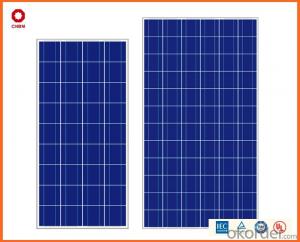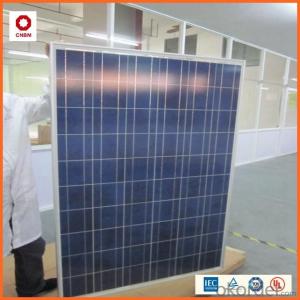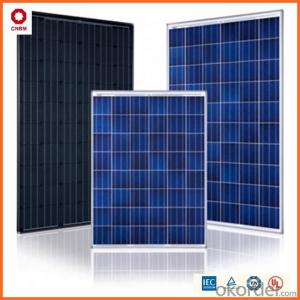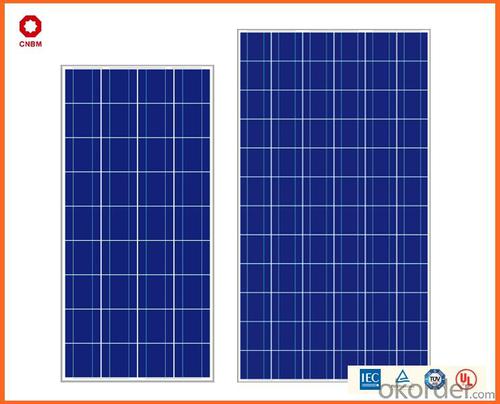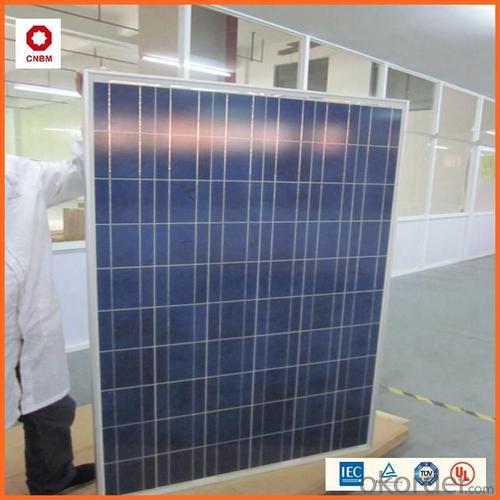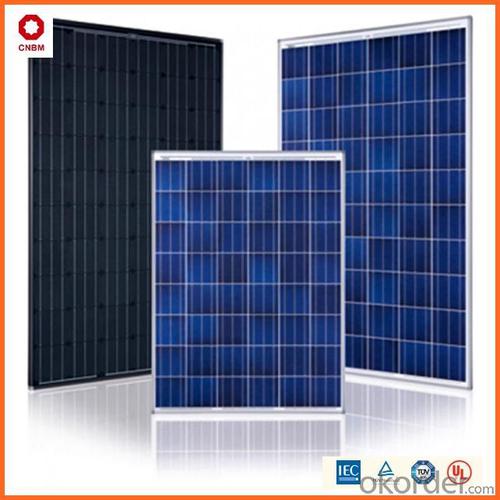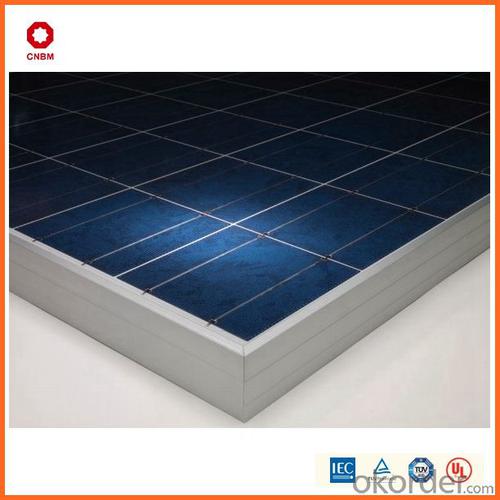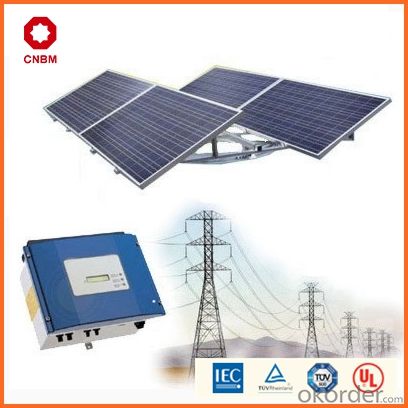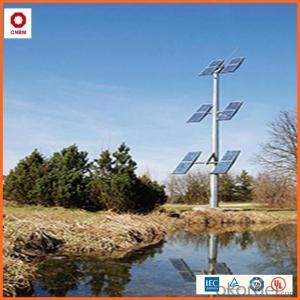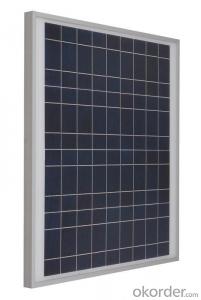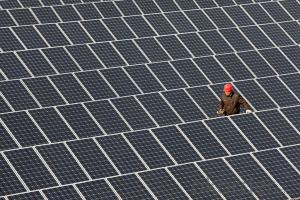John Maui Solar Energy Systems 50w Poly Small Solar Panels with Good Quality
- Loading Port:
- China main port
- Payment Terms:
- TT OR LC
- Min Order Qty:
- 1 watt
- Supply Capability:
- 10000000 watt/month
OKorder Service Pledge
OKorder Financial Service
You Might Also Like
Specification
Hot Sale !!! Quality and Safety of Small Poly Solar Panel 25~85w
1. Rigorous quality control meets the highest international standards.
2. High-transmissivity low-iron tempered glass, strong aluminium frame.
3. Using UV-resistant silicon.
4. IS09001/14001/CE/TUV/UL
Warranties of Small Poly Solar Panel 25~85w
1. 10 years limited product warranty
2. 15 years at 90% of the minimal rated power output
3. 25 years at 80% of the minimal rated power output
Specification
Characteristics of Poly solar panels CNBM (25-85W) | |||||
Max Power Voltage Vmp(V) | 30.3 | 30.8 | 31.1 | 31.4 | 31.85 |
Max Power Current Imp(A) | 7.60 | 7.64 | 7.73 | 7.81 | 7.85 |
Open Circuit Voltage Voc(V) | 36.1 | 36.6 | 37 | 37.3 | 37.68 |
Short Circuit Current Isc(A) | 8.50 | 8.55 | 8.65 | 8.75 | 8.85 |
Max Power Pm(W) | 230W | 235W | 240W | 245W | 250W |
Temperature Coefficient of Cells Poly solar panels CNBM (25-85W) | |
NOCT | 45± 2 |
Temperature Coeffucients of Isc | 0.0492 |
Temperature Coeffucients of Voc | -0.3374 |
Temperature Coeffucients of Voc | -0.4677 |
Mechanical Data of Poly solar panels CNBM (25-85W) | |
Dimension | 1638 × 982 × 40 mm |
Weight | 19.5 kg |
No. of Cells and Connections | 60 (6 ×10) |
Tolerance | 0 ~ + 5 W |
Cell | Monocrystalline Cell 156 × 156 mm |
Packing | 624 Pcs/40ft(H) Container |
Limits of Poly solar panels CNBM (25-85W) | |
Operating Temperature | -40 to +85 |
Storage Temperature | -40 to +85 |
Max System Voltage | 1000VDC(IEC) / 600VDC(UL) |
Features of our products:
• High conversion efficiency mono/poly-crystalline amorphous silicon solar cells
• Modules incorporate high performance bypass diodes to minimize the power drop caused by shading
• High transmittance, low-iron tempered glass
• High performance EVA encapsulant to prevent destroying and water.
• AI frame: without screw, corner connection. 8 holes on the frame can be installed easily
• Good performance of preventing from atrocious weather such as wind and hails
• Certifications: CE IEC TUV VDE UL, Class I
• 10 years 90% power output warranty

Shipping of Small Poly Solar Panel 25~85w
By Sea | Delivery from Shanghai or Ningbo seaport |
By Air | Departure from Shanghai Pudong Airport |
By Express | Post by DHL, EMS, UPS, TNT. |
Features of our products:
• High conversion efficiency mono/poly-crystalline amorphous silicon solar cells
• Modules incorporate high performance bypass diodes to minimize the power drop caused by shading
• High transmittance, low-iron tempered glass
• High performance EVA encapsulant to prevent destroying and water.
• AI frame: without screw, corner connection. 8 holes on the frame can be installed easily
• Good performance of preventing from atrocious weather such as wind and hails
• Certifications: CE IEC TUV VDE UL, Class I
• 10 years 90% power output warranty
As a professional Solar Panel manufacturer and Supplier in China, we have our customers come around the whole world and our specialization has got a worldwide recognition. Meanwhile, with our superior quality, competitive price, prompt and excellent service, As main role in trade section of CNBM Group, CNBM International Corporation supplies products including Monocrystalline Solar Panel, Polycrystalline Solar Panel ( multicrystalline silicon Solar Panel) have received and enjoyed famous reputation in many countries and regions in the world.
- Q: Can solar energy systems be used in areas with limited access to solar energy community initiatives?
- Yes, solar energy systems can still be used in areas with limited access to solar energy community initiatives. While it may be more challenging to implement large-scale solar projects in areas with limited solar resources, individual households or businesses can still benefit from smaller solar energy systems, such as rooftop solar panels. These systems can help generate electricity locally, reducing reliance on traditional energy sources and contributing to a more sustainable energy future. Additionally, advancements in solar technology, such as more efficient panels and energy storage solutions, can further improve the viability of solar energy systems in areas with limited access to solar energy community initiatives.
- Q: Can solar energy systems be installed on sloped roofs?
- Solar energy systems can indeed be installed on roofs that have a slope. In fact, it is quite common for solar panels to be installed on sloped roofs. The efficiency of the solar energy system depends on the angle and orientation of the roof. Ideally, a sloped roof that faces south will ensure maximum exposure to sunlight throughout the day. Nevertheless, solar panels can still be installed on roofs with different slopes or orientations, although some adjustments in panel placement and tilt angles may be necessary. It is crucial to consult with a professional solar installer who can evaluate the specific conditions of the roof and design a customized solar energy system that is most suitable for the slope and orientation of the roof.
- Q: How often do solar energy systems need to be cleaned?
- Solar energy systems typically need to be cleaned once or twice a year, depending on the location and environmental factors. Regular cleaning helps maintain their efficiency and ensures optimal performance.
- Q: Can a solar energy system be used in areas with high levels of dust or sand?
- Yes, a solar energy system can be used in areas with high levels of dust or sand. However, it is important to note that excessive dust or sand accumulation can reduce the efficiency of the system over time. To mitigate this, regular maintenance and cleaning of the solar panels may be required. Additionally, installing the panels at an angle or using anti-reflective coatings can help minimize the impact of dust or sand on the system's performance. Despite these challenges, solar energy systems can still be successful in these areas, especially if proper precautions and maintenance are taken.
- Q: Can a solar energy system be installed on a commercial building?
- A commercial building can indeed have a solar energy system installed. In fact, numerous businesses have embraced solar power as an eco-friendly and cost-effective solution for their energy requirements. By installing a solar energy system on a commercial building, there are several advantages to be gained. These include lower electricity bills, potential tax incentives and rebates, increased property value, and a positive brand image associated with environmental responsibility. Commercial buildings typically possess ample rooftop space, which makes them perfect for the installation of solar panels. Moreover, advancements in solar technology have made it simpler and more efficient to integrate solar systems into commercial buildings. With careful planning and professional installation, a solar energy system can supply clean and renewable energy to power various operations within a commercial building, thereby contributing to a greener and more sustainable future.
- Q: How do solar energy systems affect property values?
- Solar energy systems can have a positive impact on property values as they are considered desirable features by many homebuyers. Studies have shown that homes equipped with solar panels tend to sell faster and at higher prices compared to similar properties without solar systems. The potential for reduced energy costs, environmental benefits, and increased energy independence make solar energy systems an attractive investment, ultimately boosting property values.
- Q: What is the environmental impact of using solar energy systems?
- Solar energy systems have a significantly lower environmental impact compared to traditional energy sources. They produce no greenhouse gas emissions during operation, reducing the contribution to climate change. Additionally, solar energy systems do not require water for operation and have a minimal impact on water resources. While the production and disposal of solar panels can have some environmental consequences, advancements in technology are continuously improving their efficiency and recyclability, further reducing their overall impact.
- Q: How do solar energy systems impact the efficiency of air conditioning systems?
- Solar energy systems can greatly impact the efficiency of air conditioning systems by providing a clean and renewable source of power. By harnessing the sun's energy, solar systems can reduce the reliance on traditional electricity grids, resulting in lower energy costs and reduced carbon emissions. This allows air conditioning systems to operate more efficiently, as they can draw power from a sustainable source, ultimately leading to energy savings and improved performance.
- Q: How does the cleanliness of solar panels affect their performance?
- The cleanliness of solar panels significantly affects their performance. When solar panels are dirty or covered with dust, dirt, or debris, it can obstruct sunlight from reaching the surface of the panels. This reduces the amount of sunlight that can be absorbed and converted into electricity, resulting in a decrease in the overall efficiency and productivity of the solar panels. Regular cleaning and maintenance of solar panels are necessary to ensure optimal performance and maximize energy generation.
- Q: Can solar energy systems be used for powering off-grid mining operations?
- Yes, solar energy systems can be used for powering off-grid mining operations. Solar power can provide a reliable and sustainable source of electricity to mining operations in remote areas where grid connections are either unavailable or unreliable. By harnessing the power of the sun, solar energy systems can generate electricity to meet the energy demands of mining operations, reducing their dependence on expensive and polluting fossil fuels. Additionally, solar energy systems can be customized to suit the specific energy requirements of mining operations, making them a viable and environmentally-friendly alternative for off-grid power supply.
Send your message to us
John Maui Solar Energy Systems 50w Poly Small Solar Panels with Good Quality
- Loading Port:
- China main port
- Payment Terms:
- TT OR LC
- Min Order Qty:
- 1 watt
- Supply Capability:
- 10000000 watt/month
OKorder Service Pledge
OKorder Financial Service
Similar products
Hot products
Hot Searches
Related keywords
